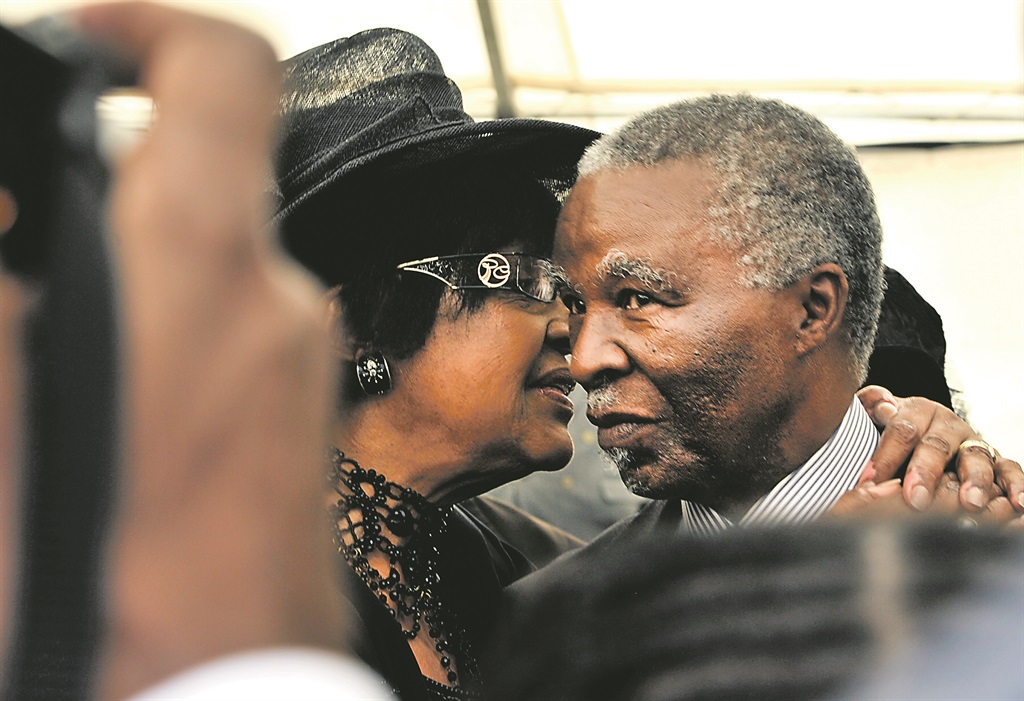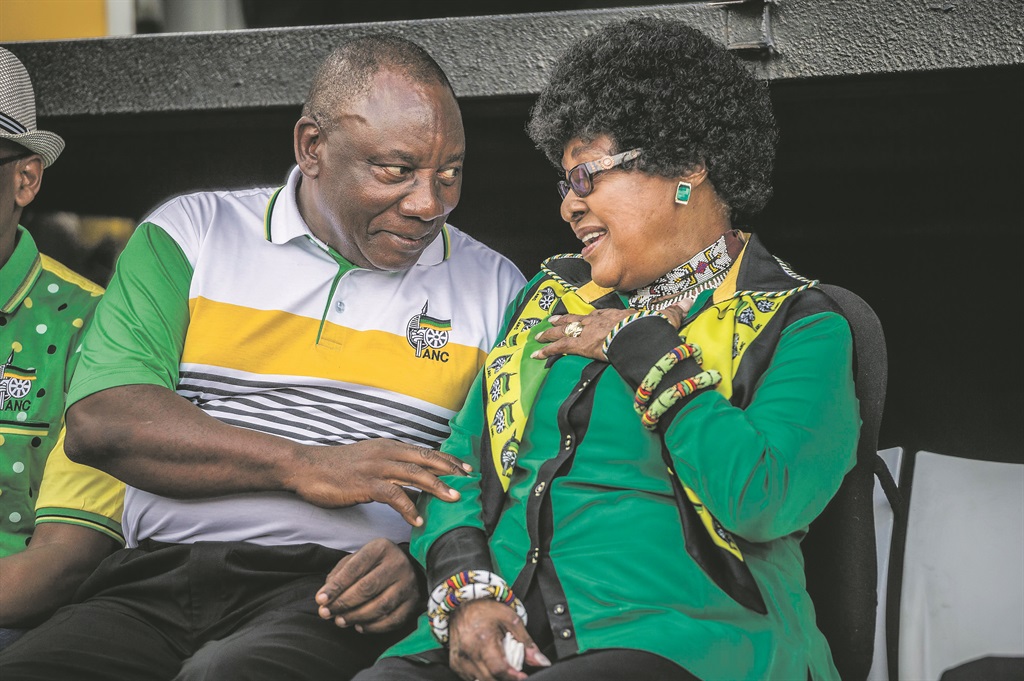
There is arguably only one leader who stood up to all four of the ANC’s presidents. Winnie Madikizela-Mandela’s relationship with all four of them was defined by the fact that she was not scared of them. With Nelson Mandela, Thabo Mbeki, Jacob Zuma and Cyril Ramaphosa, her independent streak allowed her to tell them off.
Probably no other prominent ANC leader has been as critical as she was towards the organisation for which she professed her love.
She pricked the ANC’s conscience and troubled its comfort zone in a manner that elevated her to an alternative source of strength when the poor felt let down by their leaders. Fortunately for the ANC, it was an internal outlet because she was never going to form an alternative political party.
Last month, walking with a stick and wearing yellow ANC robes, she was all smiles when she welcomed President Ramaphosa to her home and declared: “I am ANC”.
This was a triumphant and smiling Ramaphosa, not the same man she grew to dislike as a leader of the Mass Democratic Movement (MDM) about 30 years ago. The movement had distanced itself from her when the Mandela United Football Club was accused of criminal activities in Soweto.
Then MDM members and leaders were at the end of their tether because of the “moral repugnance” of “Winnie’s boys’” activities, which they felt distracted from “our urgent and primary task of fighting the regime”.
Madikizela-Mandela was upset by this public ostracism, feeling it was meant to drive a wedge between her and Nelson Mandela, who was close to being released.
This later led to Madikizela-Mandela not supporting Ramaphosa for the leadership of the ANC, instead aligning herself with Thabo Mbeki, who was to become ANC president in 1997. But, of course, this was a convenient alliance which did not last long because of Mbeki’s aversion to populism, which was an essential part of Madikizela-Mandela’s character.
After the football club debacle, her most remarkable fallout with ANC leaders came after her divorce from Mandela. Although a personal matter, many ANC leaders never quite forgave her for “causing Mandela pain”. But her isolation from the mainstream ANC meant she developed a rebellious, eccentric streak that could not be managed. This was accentuated when Mandela fired her from his cabinet after she disregarded an instruction from him not to undertake an overseas trip as deputy minister of arts, culture, science and technology.
She then became the ANC’s most vocal critic from within, routinely accusing it of neglecting the poor and failing to deliver on its electoral mandate to liberate black South Africans.
In 1997, an angry Steve Tshwete, an NEC member and then sports minister, publicly lambasted her, calling her a charlatan.
“Muddled thinking, which is aimed at exploiting the baser feelings of the population, often represents propositions that may sound radical, but are in fact rightwing. All armchair criticism and no real substance,” he wrote in The Star newspaper.
“This is typical of populism: to fail when responsibilities are given to you and yet you shout from the sidelines when it suits you.”
In a line indicating that Tshwete represented those who still smarted from the divorce, he added: “For her to try and denigrate the person of the president after the terrible pain she caused him, not only smacks of insensitivity but also serves the campaign of those who want to undermine social transformation”.
Madikizela-Mandela’s total breakdown with Mbeki happened in May 1999 after she wrote a letter to his deputy, Jacob Zuma, asking him to mediate in their relationship. She complained that Mbeki attacked her at a meeting, apparently because she had gossiped about him.
Unfortunately, when Mbeki spoke on television this week about her populist ways, he was seen to be settling old scores. During his tenure as president, Madikizela-Mandela did not back down on her criticism of the ANC and its poor service delivery record.
In an interview with this writer in 2008, after the first conflagration of xenophobic violence, she launched an attack on Mbeki’s governance style and his economic policies: “When I went to Alexandra after violence broke out, I saw the same shacks I saw in 1994. I saw the same on the East Rand.
“When some of us say poor policies and lack of service delivery are a major contributing factor, you then get headlines saying ‘Winnie attacks government’.”
Although she did not mention Mbeki by name, she blamed ANC leaders who did not tolerate debate in the party about devising failed policies. She said she and the late ANC youth league leader Peter Mokaba had been called populists and “the left of the right wing” when they raised concerns.
“I made my fears known about privatisation and about the macro-economic strategy [Gear]. I said at the time: ‘Can we go back to the drawing board and ask ourselves why Cosatu is back on the streets protesting our policies?’ The lack of debate is what has hit us now. The reality is coming to us now.”
When Mbeki was later entangled in a bitter struggle for power with Zuma in 2007, Madikizela-Mandela sought a middle way by suggesting that the status quo of 2007 should continue at the conference, with Mbeki continuing as president while Zuma was guaranteed the presidency for the next conference.
But her intervention was dismissed by both their backers, who suggested that democracy should prevail and members be allowed to choose their leaders.
History reflects that Zuma won that battle, but the ANC split and Cope was formed by a number of Mbeki supporters. Madikizela-Mandela was to later lament that, had they listened to her, the ANC would have emerged stronger from that conference.
Already old and unwell for most of Zuma’s time in government, she kept a low profile. But she was riled when Zuma visited her ex-husband and invited cameras in when Mandela was very ill.
This was seen as a stunt by a troubled Zuma to use Mandela to boost his flagging popularity. “I honestly cannot put into words how hurt the family was. It was one of the most insensitive things for anyone to have done,” Madikizela-Mandela said.
Zuma told journalists at the time that Mandela was “up and about” when he was clearly frail after a 10-day hospital stay.
With Zuma forced out of office by the ANC, Madikizela-Mandela said last month the party was overcoming its troubles and would surprise many at the polls next year.
This was the quintessential Madikizela-Mandela: ever loyal to the party, and not to one individual leader.
 |
| ||||||||||||||
| |||||||||||||||




 Publications
Publications
 Partners
Partners










